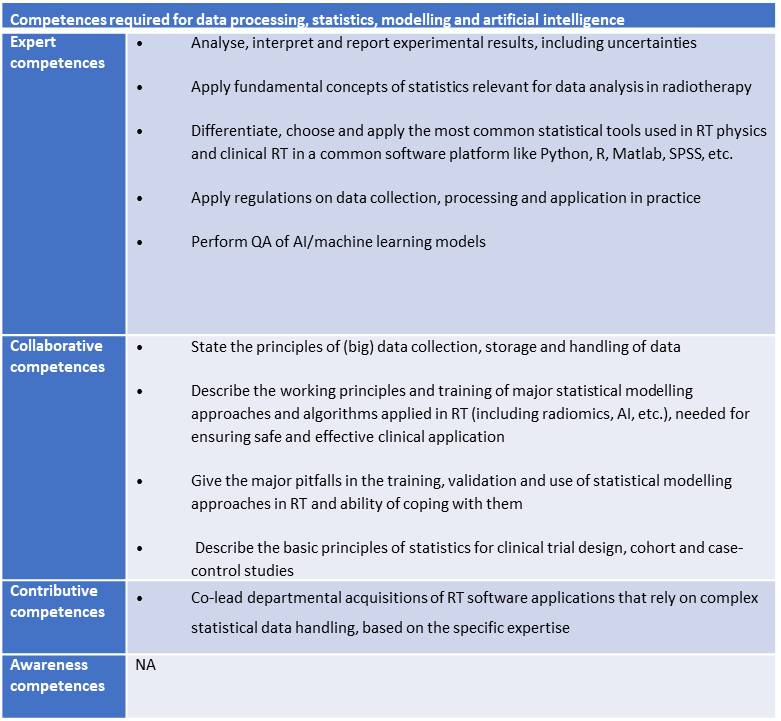Complex quantitative data analysis is becoming increasingly important in radiotherapy (RT) with many new developments. The use of artificial intelligence (AI) in the different steps of the RT chain foresees new technical responsibilities of the Medical Physics Expert (MPE). Some of these are related to the generation of pseudo CT’s from MRI, treatment planning, the conversion of CBCT pixel values into Hounsfield units, equipment QA, and novel approaches of (pre-)treatment QA. The MPE will, more and more, encounter advanced (statistical) data analysis approaches also from the clinical prospective in e.g., image segmentation, predictive modelling, outcome data analysis, multi-modality imaging, radiomics, development and application of imaging biomarkers, and genetic profiling. The MPE in a RT department, thanks to the high-level mathematical background, represents a bridge between the radiation oncologist and manufacturers and suppliers of systems based on complex data analysis. It is a primary task of the MPE to ensure that the tools are used safely and effectively, in line with current regulations e.g. related to the General Data Protection Regulation and Medical Device Regulation. Another major responsibility of the MPE is to validate and configure the AI tools for the local situation. The MPE may also be involved in clinical innovation and research studies, as well as development of new applications based on advanced data analysis. To fulfil all these responsibilities, the MPE must have knowledge and skills on data collection and advanced data processing and analysis including AI tools/deep learning and should develop the relative competences.
An adequate education and training on these topics are therefore required. The 3rd ESTRO-EFOMP core curriculum for education and training of MPE in RT has just been released to include all the new developments in the field, such as (ablative) stereotactic-, MR-guided- and adaptive RT, particle therapy, advanced automation, complex quantitative data analysis (big data/artificial intelligence), use of biological images, and personalized treatments. Due to the continuously increasing RT complexity, more emphasis has been given to quality management. Clear requirements for a research project ensure a proper preparation of MPE residents for their central role in science and innovation in RT. The concept of competency-based education was reinforced by introducing the CanMed role framework adapted the to the role of MPE to align the MPE training with the highest professional training level. Moreover, four levels of competencies (expert, collaborative, contributive, awareness) with increasing proficiency have been defined. In particular, the expert level requires that the MPE should be able to undertake tasks independently, without supervision, and take full responsibility for all aspects of the outcome, report, etc. The collaborative competence requires that the MPE should be able to undertake tasks, working alongside another MPE with specific expertise on a given topic, and make a useful contribution; however, they would not be expected to take full responsibility, as they would not be considered an expert in this topic. The contributive competence requires that the MPE should be able to undertake the tasks alongside an expert from a different discipline in RT (eg. radiation oncologist, radiation therapist, oncologist, radiologist, surgeon etc..) and make a useful contribution from a physics perspective, however they would not be expected to take full responsibility for the final decision which would be from another discipline. Finally, the awareness competence requires that the MPE should have a basic understanding of different aspects of oncology and how they relate to RT, but would not be expected to be an expert. The different levels of competences required for data processing, statistics, modelling and artificial intelligence are reported in the table. Computing and programming skills are implicitly required to reach the expert competences. To the section Data processing, statistics, modelling and artificial intelligence 8 ECTS (European Credit Transfer and Accumulation System) out of 240 for the suggested 4-year training period, have been assigned.
